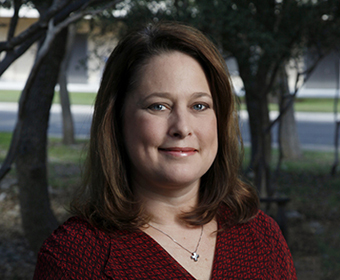
Texas Monthly named UTSA cybersecurity professor and researcher Nicole Beebe one of the state's top innovators.
(Feb. 7, 2018) -- Nicole Beebe is the director of the UTSA Cyber Center for Security and Analytics. She specializes in digital forensics, a branch of cybersecurity that involves the recovery and investigation of material found in digital devices.
This month, Beebe was named by Texas Monthly as one of “15 Innovators Reshaping Texas.” As one of the leaders of the cybersecurity revolution in San Antonio, Beebe is engaged in several research projects, including one for the U.S. Department of Homeland Security that is aimed at strengthening insider threat detection. She also oversees the UTSA Cyber Center for Security and Analytics, part of one of most highly-regarded cybersecurity programs in the country.
We sat down with Dr. Beebe to learn about new developments in cybersecurity.
What is the most important thing happening in your field that no one is talking about but should be?
I’m not suggesting no one is talking about this, but surely not enough people are talking about the impending disaster of a teacher shortage in cybersecurity. The field is frequently highlighting the roughly two million workforce shortage in cybersecurity that we will all be feeling the effects of in two to three years. And, we are doing a good job at getting students interested in cybersecurity, as evidenced by the exploding enrollments in cybersecurity at UTSA and other universities.
But what people aren’t talking about enough, and what we are already experiencing, is a shortage of quality folks at all levels to train and educate students in cybersecurity. It’s a real issue, and with negative unemployment in cybersecurity and folks earning very high wages outside of education, it is hard to recruit folks to teach.
How does interdisciplinary work help research efforts in your field?
Interdisciplinary work doesn’t just help research efforts in cybersecurity, it’s a flat-out necessity. Cybersecurity is an extremely diverse field from highly technical sub-domains like cryptography, access control and digital forensics to non-tech domains such as law, policy, behavior and risk.
Not only is the field wide, both the threats and our defenses are multi-dimensional – solutions brought to bear from the perspective of only one discipline leave gaping holes in security. You can’t truly solve cybersecurity challenges without interdisciplinary collaboration and solutions.
Have you had any mentors? How does their guidance inform what you do now?
I have had the great fortune of many mentors over the years. Some have been specifically cybersecurity-oriented. Other have been professional or personal mentors. Mentors are very important – whether formal or simply successful people you identify to “study” and emulate. When you pay attention to successful people and take the time to really understand why they’re successful, you can learn a great deal.
What advice do you have for this generation of students?
Get involved and make cybersecurity an intellectual hobby and social club. There are so many opportunities for students to engage in cybersecurity with others outside the classroom, from competitions and challenges, to clubs, meet-ups, blogs and boards.
What makes The Cyber Center for Security & Analytics unique?
We pride ourselves on our strong relationship with researchers across a wide variety of disciplines both internal and external to UTSA. This allows us to leverage the gamut of cyber and analytics subject matter expertise as we tackle real-world problems. Our multi-disciplinary approach to developing high-impact, applied research brings together great minds from fields such as business, cybersecurity, information systems, computer science, electrical and computer engineering, mechanical engineering, statistics, management science, criminal justice, psychology and others. These partnerships really help us affect change for industry and government partners and enhance UTSA’s educational programs in cyber and analytics.
Learn more about Nicole Beebe.
Explore cybersecurity at UTSA.
Learn more about The Cyber Center for Security and Analytics.
Connect with UTSA online at Facebook, Twitter, YouTube, Instagram and LinkedIn.
UTSA Today is produced by University Communications and Marketing, the official news source of The University of Texas at San Antonio. Send your feedback to news@utsa.edu. Keep up-to-date on UTSA news by visiting UTSA Today. Connect with UTSA online at Facebook, Twitter, Youtube and Instagram.
Move In To COLFA is strongly recommended for new students in COLFA. It gives you the chance to learn about the Student Success Center, campus resources and meet new friends!
Academic Classroom: Lecture Hall (MH 2.01.10,) McKinney Humanities BldgWe invite you to join us for Birds Up! Downtown, an exciting welcome back event designed to connect students with the different departments at the Downtown Campus. Students will have the opportunity to learn about some of the departments on campus, gain access to different resources, and collect some giveaways!
Bill Miller PlazaCome and celebrate this year's homecoming at the Downtown Campus with food, games, giveaways, music, and more. We look forward to seeing your Roadrunner Spirit!
Bill Miller PlazaThe University of Texas at San Antonio is dedicated to the advancement of knowledge through research and discovery, teaching and learning, community engagement and public service. As an institution of access and excellence, UTSA embraces multicultural traditions and serves as a center for intellectual and creative resources as well as a catalyst for socioeconomic development and the commercialization of intellectual property - for Texas, the nation and the world.
To be a premier public research university, providing access to educational excellence and preparing citizen leaders for the global environment.
We encourage an environment of dialogue and discovery, where integrity, excellence, respect, collaboration and innovation are fostered.